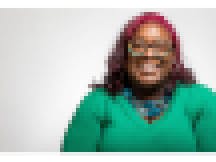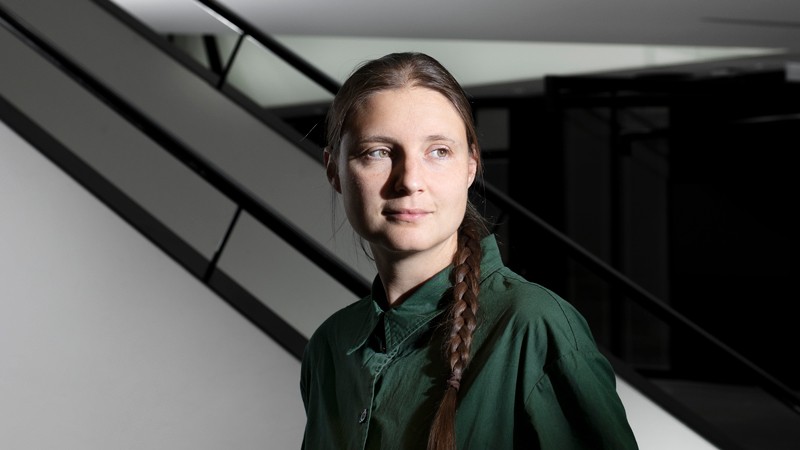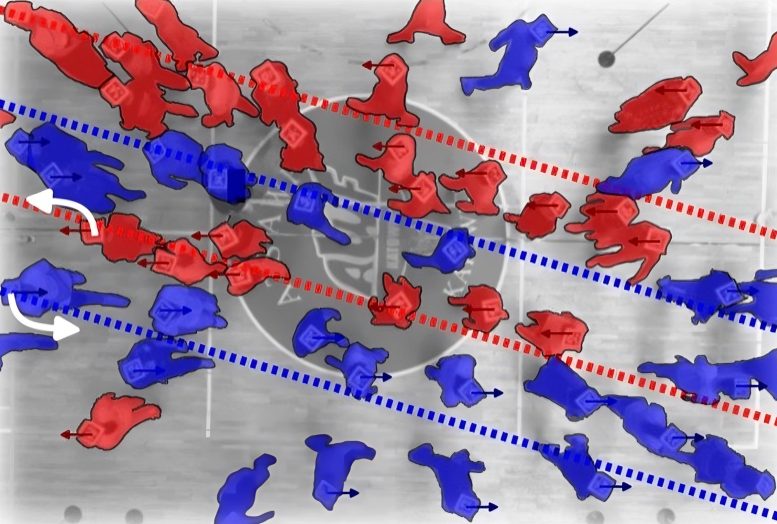Encouraging Black Ladies to Convey a Daring Voice to Arithmetic

At some point, when Nicole M. Joseph was within the third grade, she raised her hand at school to reply a math query. The trainer didn’t name on her.
Her mom occurred to be standing outdoors the door observing the classroom and was sad about what she noticed. It appeared to her that Nicole, a Black woman, was being ignored by her trainer, a white lady. So she noticed to it that her daughter moved to a unique class — a sophisticated class.
That little woman went on to review math and economics in school, then grew to become a math trainer and a teacher-coach. Immediately, Joseph is an affiliate professor within the Division of Educating and Studying at Vanderbilt College and the director of the Joseph Arithmetic Schooling Analysis Lab.
EdSurge not too long ago talked with Joseph about her new e book, “Making Black Ladies Rely in Math Schooling.” It shares findings from her analysis concerning the experiences Black women and girls have with regards to math schooling, and it lays out what she describes as “a Black feminist imaginative and prescient for transformative educating.”
This interview was evenly edited for size and readability.
EdSurge: Please inform us about your individual journey as a younger pupil in math and the way that informs your work at present.
Nicole M. Joseph: I’ve all the time actually beloved math.
Once I was a youthful pupil, I used to be that child who was in a position to do college. I knew the right way to discuss to the suitable folks and determine what courses and issues that I wanted. That’s not as a result of I had a legacy household that every one went to school. That was as a result of I simply had one thing in me the place I realized the right way to community and work together with folks very, very early. And I simply started to look at how people [who had] what I believed was extra energy, I simply noticed to see how they moved on the planet and started to have interaction them.
That third grade class, the place I open the e book, actually did change my life, as a result of my mother advocated for me. And that’s a key factor all through the e book that I attempted to essentially elevate: We now have to advocate for Black women. It was all of perhaps 15 or 20 minutes that modified the trajectory of my life when it comes to arithmetic.
Attending to center college, the place I had a counselor, Mrs. Bennett — God relaxation her soul — she was a Black lady who informed me, “You actually have to be within the superior programs.” And I mentioned, “Positive.” I took the check. I didn’t cross the check for the maths half, however she put me within the class anyway. And that was one other actual expertise that confirmed me what advocacy can do. So I used to be in a position to take algebra, for instance, in eighth grade, which put me on the trajectory to make all of it the way in which to statistics previous calculus as soon as I bought in highschool.
So it’s advocacy that basically modified my life.
I loved math due to its energy to assist me perceive issues. To not simply sit within the library and do a protracted downside; it wasn’t about that for me. It truly is like, man, in case you could be math literate — I don’t care in case you’re an artist, in case you’re a nurse, in case you’re a janitor — math literacy goes that can assist you push ahead in your life and simply open up so many alternatives. In order that’s one of many explanation why I believe I actually fell in love with math, and why I loved it, and why I attempt to assist my college students and all people else round me see its energy.

What are the alerts that Black women obtain that perhaps they don’t belong in math settings?
I believe a few of these alerts embrace erasure of their methods of realizing.
For instance, I’ve realized by way of a few of my analysis that Black women need to have the ability to have extra of a household, relaxed setting — to have the ability to snicker and be social — whereas on the identical time doing their math work. And that may be thought of disrespectful or off job particularly math school rooms as a result of most math school rooms are like, “You might want to be targeted. You might want to be stern. You might want to listen.” When a few of them present up in areas the place, you realize, they need to sing concerning the math, or no matter, these issues are usually not welcome. These methods of realizing are usually not welcome within the class.
I believe one other one is the stereotypes of adultification. Black women are adultified as early as age 5, the place lecturers really feel like they need to know higher, that they need to be on job each single minute, and in the event that they roll their eyes or do one thing like that, lecturers take that as an affront, and oftentimes they’re despatched to the workplace.
One other sign that they don’t belong is when lecturers haven’t taken the time to essentially perceive, broadly, Black girlhood, but additionally simply the Black women which can be in your room, in your class.
It sounds cliche — get to know your college students, or construct relationships along with your college students — however these actually are key practices that may make a distinction that I believe quite a lot of lecturers simply don’t take the day trip to do.
In distinction, what are the sorts of math school rooms and climates that assist what you name Black women’ pleasure? What fosters studying and pleasure for Black women within the classroom?
Laughter and socialness, and having a vibe.
Black women have mentioned they love to have the ability to have a reference to their math lecturers. In order that they must type of cross the vibe check. She may need to simply go up and say, “Hey, Mr. Smith, what did you do for the weekend?” or be capable of discuss to their math trainer about something, it doesn’t essentially must be math. And people issues assist them to have stronger connections, which then helps them to need to attempt more durable, take extra dangers, do what it’s that the trainer is asking them to do.
And so these are the sorts of environments that we want, that it’s extra relaxed. And truthfully, quite a lot of different college students in all probability would like to have that sort of setting. However I’ve simply realized from some Black women that that’s actually, actually essential.
You talked about some examples in your e book of studying environments that embrace these ideas. One among them known as eMode, and it’s a Saturday math enrichment academy run by an educator named Norman Alston. What does that instance present?
These sorts of areas disrupt stereotypes and controlling photographs of Black women, one in every of them being that they’re “loud” and “obnoxious,” or no matter.
So at eMode, I believe I actually have a quote in there, Brother Alston principally was like, “I would like boldness. I desire a large voice. I need to hear you. You understand you don’t have to fret about being quiet on this class.”
So to start with, there’s a disruption of a story that simply doesn’t appear to go away in our society, and extra importantly in our colleges. The variety of Black women which have simply mentioned, “Why does my trainer all the time name me out for being loud? Everybody’s speaking.”
[The goal is for] women simply with the ability to convey their full humanity to the area. And I don’t need folks to suppose that it’s simply willy-nilly as a result of that’s not what it’s. It’s truly very orderly and really strong when the trainer is aware of the right way to train and the right way to interact in pedagogy that’s humanizing, that’s rigorous, that could be a method that basically understands the scholars which can be in entrance of them.
Energy dynamics are shared. It’s not “I’ve to have all the ability” from the trainer. Nevertheless it’s truly partaking in math issues and math conversations which can be truly empowering the women. And once they really feel empowered, they really feel like they’ll do something. They’re gonna attempt, and take extra dangers.
I’m curious to listen to your ideas concerning the position that standardized checks play with regards to Black women and Black girls in math, and what trajectories they’re set on due to these checks.
We all know that they’re biased. Nevertheless, it’s not my battle, nor my lane, to attempt to do away with them as a result of they’re simply not going to go wherever. That’s my private conviction and opinion about standardized checks.
So having mentioned that, what’s it that we do? … How do now we have transparent-slash-courageous conversations with our women concerning the realities of issues that they will face in our world society? And testing is a kind of issues, proper?
I believe being sincere about what’s on the market is essential. So let me provide you with an instance. Once I was educating, math journals had been part of what I did. I used to be educating in like 1999, 2000, method earlier than these items had been in style. However I went to an impressive trainer schooling program known as Pacific Oaks School that basically helped me discover ways to be a important, reflective teacher.
And so math journals had been part of that. The youngsters wouldn’t solely write about math, no matter it was, fractions, however they’d additionally discuss concerning the social facet. How did they really feel? The place did they take a threat? What bought them caught? Why?
The opposite factor that I’d do — identical to different lecturers — I had a “phrase wall” on my wall, and I had vocabulary that [students] wanted to know and perceive. So I’d do issues like, “OK, while you’re speaking to your neighbor, use no matter sources you’ve gotten at your disposal.” I wasn’t correcting their language, none of that. However I’d say, “There’s a check that now we have to take. It’s known as the WASL, Washington Evaluation of Scholar Studying. They’re in search of you to elucidate your solutions with phrases, numbers and photos, and so they’re gonna have vocabulary in right here that you realize you’re gonna have to know.” So I’d have them write, for instance, a paragraph, and I’d say, “You might want to do at the very least three of those vocabulary phrases which can be on the phrase wall.”
So we had that intersection the place I used to be holding their humanity intact and letting them convey their full selves, whereas on the identical time serving to them to grasp that there’s this world, and I’m not gonna ship you on the market and also you’re not ready.
That’s my mantra for lecturers and households, is that you could’t fully ignore the system. I’d love to only tear it down — do the Karl Marx. However the actuality is that we are able to’t try this. So how can we assist Black women discover themselves — convey their full selves — whereas additionally serving to them to grasp that there’s an actual world on the market that they have to be part of? And the way can we get them there, whereas additionally holding them intact — their identities, private regard, all of these issues intact? It’s difficult work, however that to me is the perfect that we are able to do.
There are conversations happening about whether or not and the right way to reform math pathways to be extra equitable to college students. A few of the questions that get raised are, is there an excessive amount of emphasis on algebra and calculus? Is rote memorization good or dangerous for sure college students? Will modifications to the curriculum make math much less “rigorous”? What do you concentrate on these debates which can be happening?
Till increased ed modifications how they function, and I’m speaking about math courses and math pathways, I believe now we have to in all probability hold the scope and sequence, or the pathway, to increased ed.
Let’s simply take Vanderbilt. If they’re nonetheless requiring three to 4 years of arithmetic, and so they’re particularly trying on the transcript for specific programs to ensure that somebody to use or be capable of get in … I believe now we have to make sure that these programs are on college students’ transcripts in Ok-12.
When it comes to what these experiences are, the precise studying in calculus or trig, sure, these issues could be made, I believe, a little bit bit extra related. So to me, “rigor” isn’t “extra work,” or ensuring that you’ve proven that you’ve had this pathway of programs. To me, I consider Webb’s “depth of data.” Can college students analyze, apply, create, innovate?
I don’t suppose that rote memorization is sweet for anybody. The fact is while you get an engineering job at Boeing or some other place, there’s going to be a pc, a calculator, there’s going to be one thing that’s going that can assist you.
Now understanding what wants to enter the pc or what’s the modeling or the programming behind it? It’s essential. However you realize, memorizing is simply not good.
I simply love tasks. How can we create tasks for college students to have interaction in? As a result of what you do is, you give them a motivation to really have to be taught the maths that’s linked to no matter that mission is.
You give some examples from historical past concerning the significance that traditionally Black faculties and universities and girls’s faculties have performed in supporting Black women and girls in math. What’s essential about these establishments?
My doctoral pupil, Micaela Harris, she talks about how when she was at Spelman and Smith — she truly went to each locations — to start with, they’ve commitments, ideological commitments, to make sure that girls, Black girls, are creating as leaders. When that’s the core of what you do, then you’re making certain that all the things — from how you reside in a dorm to school rooms to extracurricular actions — is constructed round supporting girls, constructed round sisterhood, constructed round empowerment, the entire issues which can be essential. I consider that these girls’s faculties have contributed enormously to Micaela and different girls who’re in my lab who’ve undergraduate levels in arithmetic — to their confidence and skill.
Micaela truly mentioned that it wasn’t till she started to show that college students themselves had been questioning her, “Did you even take calculus?” She was educating a calculus class. That simply exhibits you the pervasiveness of those concepts in folks, in society, even in our kids, for them to ask this individual if she’s even taken calculus when she has a full-blown undergraduate diploma in arithmetic.
So I believe that the traditionally Black faculties and girls’s faculties have finished a superb job round actually serving to these girls who select to main in math see themselves as belonging, see themselves as creating sturdy math identities. And once they stroll outdoors of that area is when all hell can break unfastened, if you’ll, after we get into the programs and establishments that say that girls don’t belong, truly, in arithmetic.
What does arithmetic as a subject miss out on by lacking Black women and girls?
I believe the sphere misses out on quite a lot of innovation; methods of fixing issues. Black girls are a number of the most revolutionary those who I do know. Ingenuity. Vivacious. Charismatic. Deep downside solvers. I really feel that they may help us resolve a number of the most knotty issues that now we have.
Is there anything that you simply needed to say?
A part of me is eager to take up this agenda with a nationwide marketing campaign of Black girls and women deciding to do that work collectively with out fully counting on our programs.
A part of the transformative imaginative and prescient within the e book is the place I’m saying, I would like Black girls to really lead this cost. How can we interact our younger Black women into arithmetic in a method that we all know to be productive and humanizing?
I’m considering extra about casual areas, casual alternatives outdoors of colleges, and I’m seeing a few of that occur across the nation.
I need to have the Black feminist marketing campaign for Black women in arithmetic studying. I don’t know what that appears like, however that’s a dream of mine that I’m gonna be engaged on within the subsequent 5 years for positive.




.jpg)
